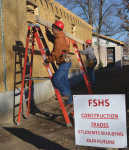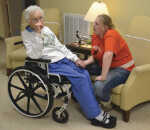Legislation helps students earn college credit

Twenty-two Bourbon County high school students are working at college level courses to prepare for the job force. Their tuition is paid for by the Kansas Legislature in a bill enacted in 2012, Senate Bill 155.
Uniontown High School (UHS) has 11 students, Fort Scott High School (FSHS) has 10 students and Fort Scott Christian Heights (FSCH) High School has one student involved in technical education courses through Fort Scott Community College. They are all taking advantage of perks put in place for them by the bill, according to information provided by FSCC.
"The Senate Bill 155 was implemented by the legislature to provide funding for college tuition for Kansas high school students earning college credits and simultaneously industry credentials in technical education courses," according to FSCC's website. "The opportunity for college tuition applies to all technical courses in approved programs at public community and technical educational institutions. The initiative includes school transportation costs to transport high school students to the local community or technical colleges."

The main obstacle is recruiting students that have room in their schedule to travel to campus and take a course, according to information provided by FSCC.
FSCC is working to put classes in high schools so that a Uniontown student, for example, only needs an hour for a welding class, not travel time, too.
Governor Sam Brownback, at the implementation of the program in 2012, said he didn't want to create career tracks often seen in Europe, where students have to choose between a technical track or a higher education track.
"What I want to see is for those people to get that technical certificate or CNA while they're in high school and then later go become a medical doctor or get that welding certificate while you're in high school and later become a mechanical engineer and own the company," Brownback said in the article on FSCC's website.
SB115 can help prepare them high school students for high demand technical careers. Families save tuition costs, and starting salaries for many of these careers range from $25,000-$45,000, according to FSCC's website.
Next step
One Uniontown High School student is starting her medical career in high school.
"I want to become a doctor and this is my first step," Ashley Van Zant said.
She is working on Certified Nursing Assistant certification at Medicalodges through the SB155 program.
Two other UHS students are working towards possible medical careers, following this CNA training.
UHS student Rebecca Van Zant is taking the CNA course to see if she wants to become a nurse, she said, while UHS student Hannah Doherty is going to pursue an ultrasound technician education.
UHS student Dana Belt is taking the course to put herself through college to become an English professor, she said.
This semester the CNA class ends Dec. 12. All the CNA students must take and pass a test on Dec. 15 for certification.
Varied possibilities
At UHS there are currently three students working in construction trades, three in manicuring and five in Certified Nursing Assistant technical training, according to UHS Counselor Jeanne Camac.
FSHS has seven students in allied health education and three in construction trades, according to Patty Smilie, FSHS counselor.
The student from FSCH, a private school, is pursuing criminal law.
This spring FSCC will offer almost 200 vocational classes that a high school student could take under SB155.
Of those 200, about 90 classes are offered in Fort Scott, with the other 90 split between satellite campuses and high schools in the FSCC service area, according to information provided by the college.
The future Kansas workforce will have a higher demand for highly technical and skilled workers and the bill is aimed at meeting those future needs, according to the Kansas Department of Education's website.
The financial aspects of SB155 for the student are tuition reimbursement, an industry-recognized certification and transportation reimbursement to school districts transporting the high school students off-campus.
Students can speak with their high school counselor about FSCC courses in agriculture, allied health, business, computers, construction trades, cosmetology, criminal justice, environmental water technology, manicuring and nursing.
Prospective students also may call Judy Meister, FSCC Occupational Recruiter, at (620) 223-2700 ext. 5247.
The classes will be available in the FSCC spring catalogue in January. They are also listed online in the course schedule. http://www.fortscott.edu/schedule/index.aspx
